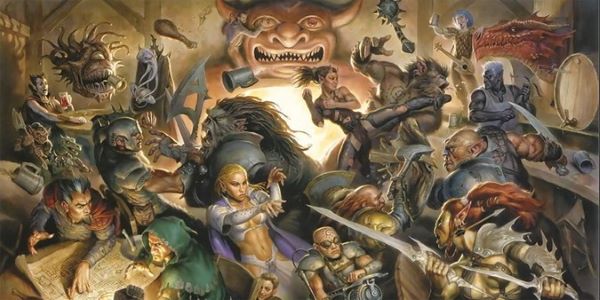As some of you may know, I have been developing a rules-lite roleplaying game specifically for leadership development. It is tentatively called Play to Lead and you can find the latest version here. One of my key design philosophies is that teamwork and collaboration are core to the game function. As such, there needs to be a mechanic that centers on this aspect. Currently, I’ve included a simple advantage style roll, similar to that used in the current iteration of Dungeons and Dragons. Effectively, if you work as a team to solve a problem roll two dice and take the best result. But, this doesn’t encapsulate the team dynamic that I am looking for. When writing a previous post on the subject I’ve realized that there has to be a more engaging way.
Therefore, I’ve decided to introduce the team dice pool, to add a new layer of strategic depth and reinforce the importance of working together. This article explores how the dice pool mechanic works, why it encourages collaboration, and how it transforms group dynamics into meaningful gameplay.
What Is the Team Dice Pool Mechanic?
In Play to Lead the team dice pool is a shared resource that players contribute to and draw from during the game. At the start of the game, add one die to the pool for each player, plus one extra. Place the dice in the middle of the table, within easy reach of everyone. Whenever the team faces a challenge, they can choose to add any number of team dice to aid the roll, but only if all players agree. Once used, team dice are removed from the pool. The team must decide whether to use the dice now or save them for future challenges in the adventure.
For example, the team are trying to fix a snowmobile to allow them to escape the Arctic research station. The mechanic suggests that they work together to mend the engine and add two team dice to the roll. A discussion ensues. Some players want to save the team dice for later in the adventure when they brave the Arctic wastes on the journey home, whilst others argue that without the engine there will be no escape. Finally they agree to use two team dice from their pool of four, leaving some in reserve for the journey ahead.
Generally, the team dice pool should be a finite resource. However, if the players do something out of left field or display great leadership or teamwork, the games master can award a dice back into the pool. Us this sparingly, as the decisions about when to use the pool are harder when the resource is finite.
Team Dice Pool Summary
- When undertaking a challenge where more than one player is involved, team may add any number of team dice to the roll. Roll the dice and take the highest number.
- All team members (players) must agree on when and how many dice should be used.
- When players do something spectacular the games master may replenish a die back into the pool (use sparingly).
This mechanic gives the team a shared resource that they must allocate together. Ultimately, forcing team discussion and collaboration.

How It Encourages Collaboration
In Play to Lead, the team dice pool is not just about numbers—it’s about strategy, trust, and communication. Here are a few ways the mechanic encourages teamwork:
- Strategic Contributions
Each player brings something unique to the table. When faced with a challenge, they’ll need to decide how many dice they can afford to contribute based on the current situation. However, they must balance this with the need to save resources for future challenges. Players have to talk things through, strategize together, and decide as a team how to best approach each obstacle and whether to use the dwindling pool of dice to enhance their chances of success. - Sharing Success and Failure
Whether the roll succeeds or fails, the outcome reflects the team’s combined effort. If they succeed, everyone feels that accomplishment because they collectively decided to use the dice pool. If they fail, it’s a shared experience, too, prompting discussions about what went wrong and how they can better support each other in the future. This shared responsibility strengthens the group dynamic and fosters a sense of collective ownership over the game’s progress. - Building Trust and Leadership
The dice pool also presents opportunities for leadership within the team. Players will need to rely on and trust each other’s judgment about when and how to use those resources. This builds in-game leadership and teaches players to recognize each other’s strengths and weaknesses. It’s a subtle but powerful way to develop trust—essential in both the game and real-world teamwork. - Promoting Balance and Equity
No single player can hog the spotlight in Play to Lead. The team dice pool is a shared resource, and everyone has a stake in its management. This ensures that even quieter or less experienced players get a chance to contribute meaningfully. The mechanic naturally balances the dynamics between stronger and weaker characters, encouraging all players to work together, regardless of individual power levels.
Making Decisions as a Team
One of the core ideas behind the team dice pool mechanic is that important decisions shouldn’t be made in a vacuum. If the team needs to figure out how many dice to commit to a challenge, they must openly discuss their take on the situation and overall goals. This creates natural moments for team-building as players assess risks, talk through options, and align on the best path forward.
It’s not just about dice—it’s about building consensus, making informed choices as a group, and learning how to lead or follow when necessary.
Fostering Communication in Play to Lead
At its heart, Play to Lead is a game about communication. Whether it’s communicating during the game to decide the best use of resources, or reflecting on the outcome of a roll and figuring out how to improve next time, this dice pool mechanic brings team communication to the forefront.
This dynamic creates a natural, in-game space for conversations about leadership, trust, and collaboration, aligning with the game’s mission to teach these real-world skills through play.
Final Thoughts
The team dice pool mechanic in Play to Lead is more than just a gameplay feature—it’s a tool to foster teamwork, enhance communication, and build trust among players. By having a shared resource that gives significant advantage on in game challenges, it encourages players to work together, strategize, and support one another.
This mechanic not only makes the game more fun but also brings the game’s central message of collaboration and leadership to life in a tangible, engaging way. In Play to Lead, the team’s success isn’t just about individual accomplishments—it’s about what the group can achieve together.
While I have written this article about my own ruleset, I believe this mechanic could also work in other roleplaying games. In D&D a team dice pool of D20’s could be used to confer advantage for team based challenges. What do you think? Would you try implementing a team dice pool in your own games? Let me know how it works for you!



